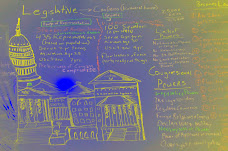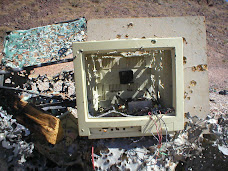Before we begin this week’s lesson, let’s have a brief review of the concept of numbers.
Look at your hands. That is the number 10. It takes but an instant to visualize the sight of them, just as it takes an instant to apprehend the concept of ten. Of course, in concept, it only takes seconds, fractions of seconds, to apprehend any number—seven point seven, four hundred and ten, eight thousand five hundred and seventy, a million, a billion, $10,997,999,164,142.97 (as of 17 Mar 2009 at 06:03:57 PM GMT ). See? They’re all just numbers.
Now if you are still looking at your ten digits (which means I suppose, you’re not reading these instructions, but anyway), imagine, briefly, that you have a terrible accident, an axe-related accident, Jerry Garcia-style, an errant swing, a simple instant, you look down and it’s gone. Your life is changed forever. Immediate agony, the spray of blood, the mad dash to find the finger, hopefully with access to modern medical facilities, the continuing sight of its absence, the ever expanding amount of blood; and if it can’t be reaffixed, your life and your entire conception of mathematics screwed for good. In your imagination, which digit did you choose to lose?
That is the power of one.
Now, let’s talk about scale. Scale is why little kids fall down and go boom all day long without so much as a scrape when we full size adults would break a hip. Scale is why a flea can jump 100 times his height; but it is also why we can still kick his ass with our mere fingernails. Remember the power of one? Now ten times that, all the fingers you have, both of your hands. OMG. That is ten; and it just gets bigger from there.
But for now let’s start back with one. If you took one second to count to one and kept counting at that pace, it would take, obviously, ten seconds to count to ten. That is about how long it takes to know if your car is going to start as you’re driving yourself to the ER with your severed appendage sloshing in a Ziploc baggie w/ ice cubes. It would take you just under two minutes to count to one hundred. In that length of time you could have called 911 and gotten the directions. That’s if you didn’t get the phone too bloody. That’s if you had a phone. One hundred seconds can be an incredibly long time indeed.
It will take about 17 minutes to count to one thousand. If it takes much longer than that to get to the hospital you are liable to lose quite a bit of pinkie mobility. It will take you just over eleven and a half days to count to one million and by that time you should be able to know if you will ever have use of that one finger again. It would take an entire generation, almost thirty-two years, to add up to a billion seconds. But even at that length of time, it might still be hard to reconcile one’s self if there had not had access to the best of modern medical care.
And a trillion? Well that number is so large as to dwarf our very conception of time--to consider a trillion seconds. It is a measure longer than history itself. A trillion seconds ago, some caveman was leaving his nine fingered paw print on a wall somewhere and wishing someone would invent fire so he could cauterize the wound. A Trillion? That’s thirty-one thousand years. A trillion seconds ago it would still be another 300 generations till humans would even invent agriculture, much less sutures. And another 595 or so generations after that before anyone would even have a chance of saving a lost digit. The loss of which, of course, could happen in a simple second.
A trillion, a billion, a million, one--that is what we mean when we talk about scale. Scale is, when you look at it, such a major consideration that entire academic disciplines have sprung up to explain the concept and importance of scale to generations of cavemen, who still continue to swing their axes far too casually for safety sake. And still occasionally, the nine-fingered among us come to understand the power of one all too well.
Media, on the other hand, gain no benefit from conveying distinctions in scale. From their mediated distance numbers are forever mere concepts and not the fingers of the audience--unless of course you are the one doing the bleeding. It’s the media’s stock and trade to slosh around numbers like “billion” and “million” and ever more often lately, “trillion,” as if they would all fit somehow into the same Ziploc baggie along with a couple of ice cubes.
That in mind, thank god, or if not him then somebody, the media has stopped yapping about earmarks. In the absence of a Republican outrage, mainstream media recently acting as if pundits, pummeled Obama for not quashing the omnibus spending bill due to the wealth of pet projects. More than 8000, count ‘em earmarks. Wow. Almost eight billion dollars. Double Wow!
Seriously that is a great big number: that’s all sorts of projects in all sorts of places for all sorts of people everywhere. No wonder Repubs hate it. Besides it’s also a whole lot of fingers in a whole lot of pies. Imagine how many hands that number must tie to. That is the power of jobs, which ultimately are the currency of earmarks: somebody hired to do something. And earmarks are not some secretive private thing. It is a public project being started, a company put to work, a goal set and a landscape or a society, hopefully, being improved through judicious government spending.
An earmark is also your congressman doing precisely what he was elected for, which is to represent his part of the country and do his best to promote tranquility and prosperity for his constituents.
Republicans in general have traditionally railed against earmarks, all the while racking them up with the best of the Dems. Of course I live in a state where my iconic congressman is so proudly anti-earmark, he refuses to do a darn thing for the homefolk at all. Thanks again, John McCain.
Obama speaks the language of earmark, being a former master of them while in the Senate. Let the media chaff about earmarks all they want. Obama’s touch on the Omnibus Spending Bill buys hands full of good will. Further, unlike his vengeful predecessor, Obama allowed both sides of the aisle to stud the bill with earmarks. Repubs, besides McCain, aren’t whining this go-round because they too scored big time.
The Whitehouse has been careful to frame the argument on this one as “last year’s business” as Obama calls for the new standards he hopes to set. Perhaps, since Obama claims he wants to improve the education of the cavemen who still try to rule this country he could hire some teachers to remind them of the power of scale.
As in that even if eight thousand five hundred and seventy is a great big number (as in the number of earmarks in the bill), seven, as in seven point seven billion dollars of the total four hundred and ten billion for the Omnibus Spending Bill overall. It’s about two percent.
Yes, a billion is a very big number, but to spend a billion or even seven point seven of them spent for the good will and PR these 8000+ jobs projects around the country will generate is not a bad way to spend two percent of the overall budget on a government bill. Bush used to spend more than that on rendition.
--though on spring break, mikel weisser continues to write from the left coast of AZ.
Subscribe to:
Post Comments (Atom)










No comments:
Post a Comment